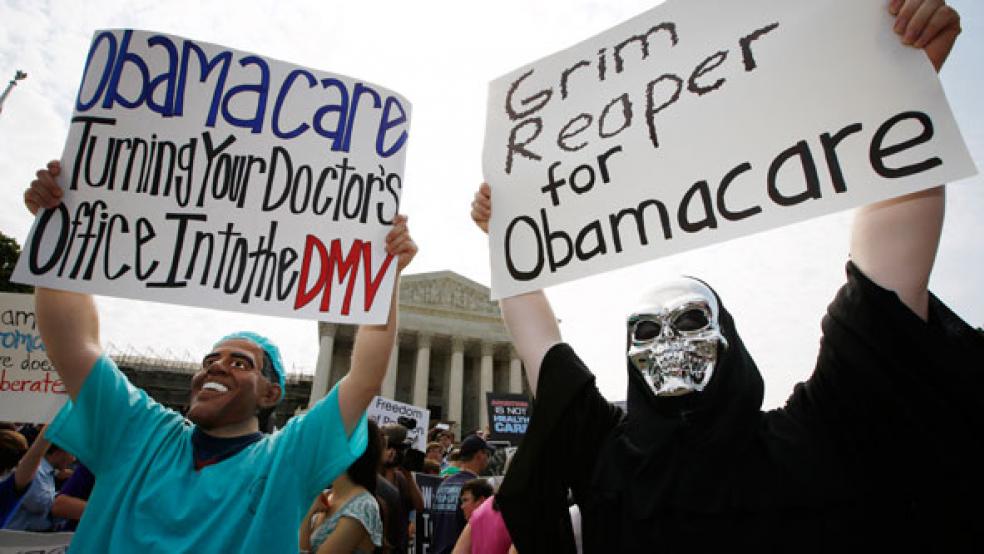Deb McEneaney of Sag Harbor, N.Y., was jolted in November when her insurance company notified her that it was canceling a group health plan that had been tailor made for her and her husband and their family-run business.
Her insurance broker assured her she had nothing to worry about when the administration began the formal rollout of Obamacare on Oct.1. But the insurance company, United Healthcare Oxford, subsequently wrote her saying that it would no longer allow group health plans for two people who were related because of new restrictions under the Affordable Care Act.
Related: Millennials Jump Ship Over Obamacare Bait and Switch
“I don’t know if I can totally blame Obamacare, but of course I will forever,” she said during a recent interview. “I believe that everyone has the right to health insurance. But I also believe that if you’ve been paying insurance your entire life and have never gone without medical coverage, and you pay your bill on time, that the rug shouldn’t be pulled out from under you when you’re 60 years old.”
McEneaney was one of millions of Americans who received cancellation notices from their insurers this summer and fall, either because their policies didn’t comply with the new requirements for coverage under the Affordable Care Act or for other technical reasons.
McEneaney and her husband favored the group health policy approach because it provided better coverage for them and their 21-year old son than other policies available in the individual insurance market.
Then came the letter from United Healthcare Oxford, which clearly stated: “Under the ACA, when a business is owned only by an individual or an individual and his or her spouse, these individuals are not considered ‘employees’ and the benefit plan is not considered a group health plan.”
“As of Jan. 1, 2014, these individuals will no longer be able to purchase group coverage and will need to purchase individual coverage,” possibly through the New York insurance exchange created under the Affordable Care Act.
Related: 39 Dems Help GOP Pass Insurance Cancellation Bill
Now McEneaney and her husband are scrambling to find replacement coverage, preferably through her insurance broker. But she frets that she might not end up with as good a policy as her current coverage, or that the premiums and co-payments may be higher, or that her long-time family doctor might not be in the new insurance company’s network.
McEneaney’s loss of insurance coverage is shared by more than four million households across the country that were notified that their policies were being cancelled because of Obamacare. President Obama had promised Americans that they could keep their health insurance coverage if they liked it, but that didn’t prove to be the case.
Under a barrage of criticism that he had misled the public, Obama last month changed a key rule of his healthcare law by allowing insurers to renew the old plans for one year, but only if state insurance commissioners and insurance companies agreed.
So far Arkansas, Vermont and Washington State have rejected the president’s rule change, while other states are still deciding. This has left many uneasy or angry families searching for new coverage before Dec 23 – the enrollment deadline to sign up for a new policy effective Jan. 1.
Related: Obamacare Fixes Hide a Big Mess on the Back End
Even after the administration made hundreds of improvements to the troubled Obamacare website, many people are still encountering difficulty.
Ed Anderson, a graphic designer from Columbus, Ohio, who was recently bumped from his wife’s insurance policy for reasons relating to the new law, discovered that his family’s monthly premiums will double even if he chooses the most inexpensive plan available to him through the new federal insurance exchange in his state.
Anderson said he and his wife currently pay a monthly premium of $460 through Blue Cross Blue Shield. But now that he can no longer stay on his wife’s plan, he will have to get his own coverage. The most inexpensive option would cost him a $428 monthly premium. And he and his wife can’t qualify for a federal subsidy because their joint income exceeds the cutoff. The new insurance policy will cost the Andersons an extra $5,000 a year in premiums alone.
“When you’re trying to keep your house, pay car insurance and put your kid through college, it’s tough,” Anderson said. Everything we do is going to be affected by this. Getting groceries, eating out. Going anywhere. It’s just crazy.”
For others, the policies purchased through the exchanges are proving to be more affordable than what they had.
Bill and Linda Wood, small business owners from Westerville, Ohio, just purchased a plan on the new insurance exchange that will save them about $6,200 on premiums next year alone. This was extremely welcoming news for the Woods, who received a cancellation notice from their insurer last summer stating that their plan did not meet Obamacare standards.
Under their new policy, the Woods will pay a monthly premium of $130 after subsidies, compared to the $360 monthly premium under their old plan.
It wasn’t just the prices that made them satisfied customers. “Because we’ve had experience with illnesses, being able to go to the same doctors is important to us. Our plan’s network includes every hospital and doctor we’ve dealt with. And that was the highest priority for us,” Wood said.
Although Wood said he made several unsuccessful attempts to enroll through the troubled website, he eventually was able to sign up for coverage with the help of the hotline.
“We heard there had been some problems with the website so I called to make sure we really had insurance,” Wood said. “It all went through. I just got the bill and paid the first month’s premium and now we have health insurance.”
Top Reads from The Fiscal Times:






